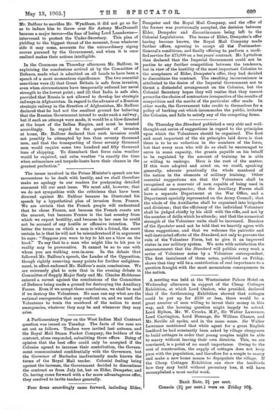The issues involved in the Prime Minister's speech are too
momentous to be dealt with hastily, and we shall therefore make no apology to our readers for postponing detailed comment till our next issue. We must add, however, that we do not sympathise with the criticisms that have been directed against Mr. Balfour because he illustrated his speech by a hypothetical plan of invasion from France. We are certain that the French people will understand that he chose France, not because the French coasts are the nearest, but because France is the last country from which we expect hostility, and because in her case he could not be accused of any hostile or offensive intention. The better the terms on which a man is with a friend, the more certain he is that he will not be misunderstood if in argument he says : "Suppose you were to try to hit me a blow on the head." To say that to a man who might like to hit you in reality may be provocative. It cannot be BO to one with whom you are walking arm-in-arm. In the debate that followed Mr. Balfour's speech, the Leader of the Opposition, though rightly reserving many points for further enlighten- ment, in effect endorsed Mr. Balfour's main conclusions. We are extremely glad to note that in the evening debate in Committee of Supply Major Seely and M. Charles Hobhouse entered a caveat against the conclusions of the Committee of Defence being made a ground for destroying the Auxiliary Forces. Even if we accept these conclusions, we shall be mad if we destroy the Volunteers. No man can say what are the national emergencies that may confront us, and we need the Volunteers to train the manhood of the nation to meet emergencies, whatever they may be and whenever they may arise.






































 Previous page
Previous page